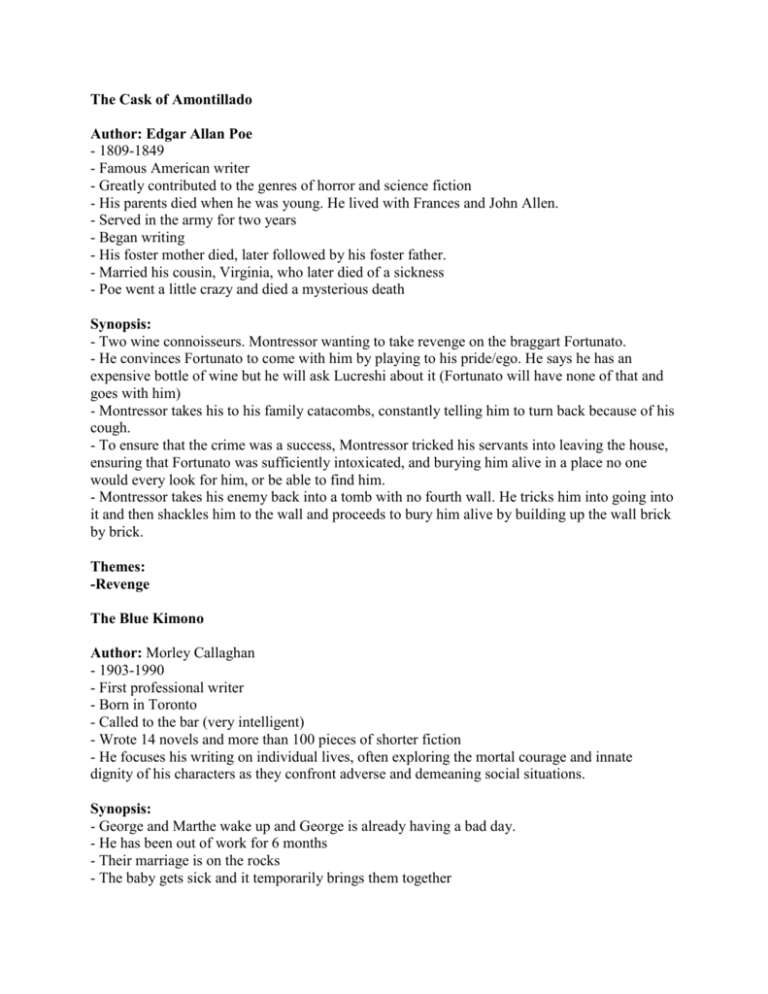test_review
advertisement

The Cask of Amontillado Author: Edgar Allan Poe - 1809-1849 - Famous American writer - Greatly contributed to the genres of horror and science fiction - His parents died when he was young. He lived with Frances and John Allen. - Served in the army for two years - Began writing - His foster mother died, later followed by his foster father. - Married his cousin, Virginia, who later died of a sickness - Poe went a little crazy and died a mysterious death Synopsis: - Two wine connoisseurs. Montressor wanting to take revenge on the braggart Fortunato. - He convinces Fortunato to come with him by playing to his pride/ego. He says he has an expensive bottle of wine but he will ask Lucreshi about it (Fortunato will have none of that and goes with him) - Montressor takes his to his family catacombs, constantly telling him to turn back because of his cough. - To ensure that the crime was a success, Montressor tricked his servants into leaving the house, ensuring that Fortunato was sufficiently intoxicated, and burying him alive in a place no one would every look for him, or be able to find him. - Montressor takes his enemy back into a tomb with no fourth wall. He tricks him into going into it and then shackles him to the wall and proceeds to bury him alive by building up the wall brick by brick. Themes: -Revenge The Blue Kimono Author: Morley Callaghan - 1903-1990 - First professional writer - Born in Toronto - Called to the bar (very intelligent) - Wrote 14 novels and more than 100 pieces of shorter fiction - He focuses his writing on individual lives, often exploring the mortal courage and innate dignity of his characters as they confront adverse and demeaning social situations. Synopsis: - George and Marthe wake up and George is already having a bad day. - He has been out of work for 6 months - Their marriage is on the rocks - The baby gets sick and it temporarily brings them together -- In the end, she wants to put the effort into repairing the kimono (a symbol of their life together) George does not. Themes: - Money can't buy happiness - Health and happiness The Diamond Necklace Author: Guy De Maupassant - 1850-1893 - Grew up in Normandy - At 20 he served in the Franco-Prussian war. Many of his stories came out of that experience - Realistic short stories - Produced nearly 300 stories - Had syphilis - Disease attacked his brain and he died at the age of 43 Synopsis: - The main character thinks is born into the wrong family (she is pretty, poised, and charming). She settles and marries Mr. Loisel, a petty clerk in the office of the Board of Education - He gets an invite to a ball. She doesn't want to go because she has nothing to wear. He gives her money he was going to use on a gun to buy a dress. - She decides to borrow jewels from a friend. Chooses a diamond necklace. - At the ball she is admired, but she loses the necklace on the way home. - It is going to cost $36,000 to replace the necklace. - Mr. Loisel possessed $18,000 that his father left him, and the rest they had to borrow. - They spent 10 years paying back the money only to find that the necklace was a fake and only worth 500 francs. Themes: - Sacrifice - Bad luck/Misfortune - Deception The Rocking Horse Winner Author: D.H. Lawrence (David Herbert) - 1885-1930 - Very intelligent man - British - His father was a miner and his mother was from the middle class who never accepted her husband's way of life - Torn between them, the story of his family's struggle is told in his novel, "Sons and Lovers" (1913) - Had a career as a teacher - In 1912 he ran off with the wife of a former professor - He liked to travel and did so frequently, travelling all over the world. - Spoke and wrote with the same vitality that animates all of his literary work - Died of tuberculosis at age of 45 Synopsis: - Paul as a child was told that his mother had no luck. The house had voices ("There must be more money") which drove him to prove to his mother that he had luck. - He would rock on his rocking horse until he was given the name of the winning racehorse. - He and the gardener would bet on them. - Uncle Oscar was included in the game. - Paul kept winning and he gave his mother $5000 but it didn't stop the voices, they just got worse. - The older he got, things did not change. - The gambling and need to win drove him mad and he died on a brain fever repeating the name MALABAR (the winning horse). Bassett bet on this horse and Paul left his mother $80,000. Themes: - Luck The Secret Life of Walter Mitty Author: James Thurber - 1894-1961 - Born in Columbus, Ohio - He first worked for the Columbus dispatch - Found himself as a writer when he returned to New York City in 1926 - Also became one of the brilliant contributors to Harold Ross' New Yorker magazine - Likes to include drawings with his work Synopsis: - Walter has five dreams: 1) He is a commander of a Navy hydroplane entering a storm 2) He is a world renowned surgeon entering the operating room 3) He is on trial for murder with his arm in a sling 4) He is Captain of a bombing plane 5) He is facing the firing squad - Between daydreams Walter deals with his mundane life where he and his wife are running errands. Themes: - Success vs. Failure - Desire for control/power A Cap for Steve Author: Morley Callaghan - 1903-1990 - First professional writer - Born in Toronto - Called to the bar (very intelligent) - Wrote 14 novels and more than 100 pieces of shorter fiction - He focuses his writing on individual lives, often exploring the mortal courage and innate dignity of his characters as they confront adverse and demeaning social situations. Brief Synopsis: - Steve is an only child in a very poor family. He absolutely loves baseball. - His dad takes him to a Philly game. After the game he goes to get an autograph from his idol but gets his ball cap instead. - The cap makes him a town hero and it's his prized possession, but his dad does not understand how much it means to Steve. - One day Steve loses it at the ball field. He later sees a boy wearing it who claims he bought it from another boy. - Steve and his dad, Dave, go to the boy's house (his dad's a lawyer). They learn Mr. Hudson's son paid $2 for the cap. Mr. Hudson pays Steve $20 for the cap. - Steve is upset because his dad let him down, but their family needed the money. - In the end Dave tells Steve he'll use the money on new ball equipment and that he'll help Steve improve his game. They understand each other better now. * Development of character - generates suspense, aids in generating conflict Themes: - Money can't buy happiness - Love is more valuable than material possessions A Cap for Steve Author: Morley Callaghan - 1903-1990 - First professional writer - Born in Toronto - Called to the bar (very intelligent) - Wrote 14 novels and more than 100 pieces of shorter fiction - He focuses his writing on individual lives, often exploring the mortal courage and innate dignity of his characters as they confront adverse and demeaning social situations. Brief Synopsis: - Steve is an only child in a very poor family. He absolutely loves baseball. - His dad takes him to a Philly game. After the game he goes to get an autograph from his idol but gets his ball cap instead. - The cap makes him a town hero and it's his prized possession, but his dad does not understand how much it means to Steve. - One day Steve loses it at the ball field. He later sees a boy wearing it who claims he bought it from another boy. - Steve and his dad, Dave, go to the boy's house (his dad's a lawyer). They learn Mr. Hudson's son paid $2 for the cap. Mr. Hudson pays Steve $20 for the cap. - Steve is upset because his dad let him down, but their family needed the money. - In the end Dave tells Steve he'll use the money on new ball equipment and that he'll help Steve improve his game. They understand each other better now. * Development of character - generates suspense, aids in generating conflict Themes: - Money can't buy happiness - Love is more valuable than material possessions If Hitler Asked You to Electrocute a Stranger, Would You? Probably. Author: Phillip Meyer Synopsis: - Stanley Milgram, a scientist at Yale University, desired to conduct an experiment that would gage obedience levels in an attempt to better understand the treatment of Jews by Germans during the war. - His experiment: Participants were paid $4.50. READ SHORT STORY TO FIND COMPLETE EXPLANATION OF EXPERIMENT - The results: 48% in Bridgeport went to the end of the volt system; 65% in Yale went to the end. Themes: - Obedience









